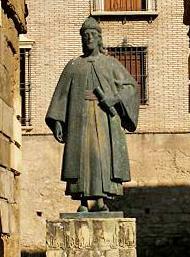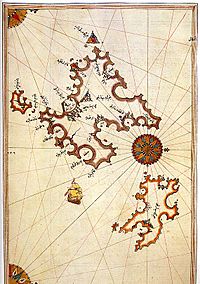Ibn Hazm facts for kids
Quick facts for kids Ibn Hazm |
|
|---|---|
 |
|
| Religion | Islam |
| Denomination | Sunni |
| Personal | |
| Born | November 7, 994 (384 AH) Córdoba, Caliphate of Córdoba |
| Died | August 15, 1064 (456 AH) Montíjar, near Huelva, Taifa of Seville |
| Influenced | Ibn Khaldun, Muhammad al-Shawkani, Rashid Rida, Muhammad Asad |
Abū Muḥammad ʿAlī ibn Aḥmad ibn Saʿīd ibn Ḥazm (Arabic: أبو محمد علي بن احمد بن سعيد بن حزم), often called Ibn Hazm, was an important Muslim scholar from Al-Andalus (what is now Spain). He was born in Córdoba on November 7, 994, and died on August 15, 1064.
Ibn Hazm was a true polymath, meaning he was an expert in many different subjects. He was a historian, a jurist (someone who studies law), a philosopher, and a theologian (someone who studies religion). He was known for being very strict in how he understood religious texts. He was a main supporter of the Zahiri school of Islamic thought. It is said he wrote about 400 books, but only 40 of them still exist today. His writings filled about 80,000 pages! Many people consider him one of the first thinkers in the field of comparative religion, which is the study of different religions.
Contents
His Early Life and Family
Family Background
Ibn Hazm came from an important family. His grandfather, Sa'id, and his father, Ahmad, both had high-ranking jobs in the court of the Umayyad ruler, Hisham II. Scholars believe his family were originally Christians from Iberia (Spain and Portugal) who later became Muslims.
Growing Up
Because his family was important, Ibn Hazm grew up around powerful and influential people. By the time he was a teenager, he had seen more of how government worked than most people would in their entire lives. These experiences made him a bit doubtful and even sad about human nature. He saw how easily people could lie and be unfair.
Because of this, he came to believe that true safety and truth could only be found with a perfect God. He thought that people, on their own, were often dishonest. So, he was known for being a bit cynical about humanity, but he deeply respected clear language and honesty in talking.
His Career and Challenges
Ibn Hazm lived right in the middle of the ruling group of the Caliphate of Córdoba. This gave him a great education in Córdoba. He was very observant and eager to learn.
After a powerful leader named Abd al-Malik al-Muzaffar died in 1008, the Caliphate of Iberia fell into a civil war. This war lasted until 1031. It caused the central government in Córdoba to collapse. Many smaller, less powerful states, called taifas, then appeared.
Ibn Hazm's father died in 1012. During this time of political trouble, Ibn Hazm was often put in prison. People suspected him of supporting the Umayyad rulers. By 1031, he went back to his family's home. There, he started writing about his strong beliefs. He became a main supporter of the Zahiri school of Islamic thought. He wrote many books, but only about 40 of his 400 works are still around.
After the caliphate fell, his political and religious rivals became powerful. So, in the 1040s, he accepted an offer to live safely on the island of Mallorca. He continued to teach the Zahiri school there before returning to Andalusia.
People at the time had a saying about him: "the tongue of Ibn Hazm was a twin brother to the sword of al-Hajjaj." Al-Hajjaj was a famous general known for being very strict. Ibn Hazm was quoted so often that "Ibn Hazm said" became a common phrase.
He believed in taking religious texts literally. He thought that deductive reasoning (using general rules to figure out specific facts) was not enough for legal or religious matters. He first followed the Maliki school of law. Around age thirty, he switched to the Shafi'i school. Finally, he settled on the Zahiri school. He is probably the most famous follower of this school. He learned its rules and methods from Abu al-Khiyar al-Dawudi al-Zahiri.
In 1029, both Ibn Hazm and his teacher were told to leave the main mosque of Cordoba because of their activities.
His Writings
Ibn Hazm wrote many books. Sadly, many of them were burned in Seville by his opponents. His remaining works are sometimes seen as repetitive. However, they also show how brave he was in challenging other scholars.
Ibn Hazm wrote books on law, religion, and even medicine. He believed that science should be part of a regular school curriculum. In one of his books, Organization of the Sciences, he suggested a five-year study plan. It would start with language and understanding the Qur'an. Then it would move to life and physical sciences, and finally to rational theology.
Besides his serious academic works, Ibn Hazm also wrote The Ring of the Dove (Tawq al-hamamah). This book is considered a very important work of Arabic literature from Al-Andalus. It is about love and relationships.
Understanding the World
In his book Fisal (Detailed Critical Examination), Ibn Hazm wrote about Islamic science and theology. He argued that what we learn through our senses is more reliable than human reason, which can be flawed. He agreed that reason is important, as the Qur'an asks us to reflect. But he said that reflection should mostly be based on revelation (divine messages) and what we learn through our senses. He believed that the rules of reason themselves come from what we experience. He concluded that reason is not for finding new things. Instead, he thought that what we see and feel should be used, which is a key idea in empiricism.
His Legal Ideas
Perhaps Ibn Hazm's most important work is The Muhalla (المحلى بالأثار). It is a summary of a much longer book. This book mainly focuses on Islamic law (fiqh). It also talks about beliefs in its first part, Kitab al-Tawheed. This part discusses the idea of one God and how to understand religious texts. A key point in this work is that Ibn Hazm did not like analogical reasoning (qiyas), which is comparing new situations to old ones. Instead, he preferred a very direct and literal way of understanding religious texts.
Logic and Thinking
Ibn Hazm wrote The Scope of Logic. In this book, he stressed that what we learn through our senses is very important for knowledge. He wrote that "the first sources of all human knowledge are the soundly used senses and the intuitions of reason, combined with a correct understanding of a language."
He also disagreed with some religious scholars who were against using logic. They argued that early Muslims did not need logic. Ibn Hazm replied that early Muslims had seen the divine messages directly. But later Muslims faced many different beliefs. So, he said, using logic became necessary to keep the true teachings of Islam. This book was first published in Arabic in 1959.
Poetry
Ibn Hazm also wrote poetry. Here is a small part of one of his poems:
- You came to me just before
- the Christians rang their bells.
- The half-moon was rising
- looking like an old man's eyebrow
- or a delicate instep.
- And although it was still night
- when you came a rainbow
- gleamed on the horizon,
- showing as many colours
- as a peacock's tail.
Medicine
Ibn Hazm learned medicine from teachers like al-Zahrawi and Ibn al-Kattani. He wrote ten medical books, including one mentioned by another scholar called Kitab fi'l-Adwiya al-mufrada.
His Opinions
Language
Ibn Hazm had interesting ideas about language. He thought that Arabic, Hebrew, and Syriac were all basically one language. He believed they branched out as people settled in different places and developed different words and grammar. He also disagreed with many Muslim scholars who thought Arabic was better than other languages. He said the Qur'an does not say Arabic is superior. Ibn Hazm believed there was no proof that any language was better than another.
Literal Interpretation
Ibn Hazm was famous for his very strict, literal way of understanding things. He was the main champion of the Zahirite school within Sunni Islam, which focuses on literal meaning. A common example of his literalism is his interpretation of a verse in the Qur'an (chapter Al-Isra, verse 23). This verse says not to say "uff" to your parents. Ibn Hazm said that this part of the verse only forbids saying "uff." He believed that hitting parents, for example, was forbidden by the second part of the verse and verse 24, which tell us to treat parents kindly.
Philosophy
Ibn Hazm's writings also touched on ideas from Greek philosophy. He agreed with philosophers like Epicurus and Prodicus of Ceos that pleasure can bring happiness and that there is nothing to fear in death. However, he believed that these philosophical ideas alone were not enough to build a good person's character. He stated that the Islamic faith was also necessary.
Ibn Hazm did not believe in absolute free will. He thought that all of a person's qualities and actions are created by God.
His Views on Shia Islam
Ibn Hazm was very critical of the Shia branch of Islam.
See also
 In Spanish: Ibn Hazm para niños
In Spanish: Ibn Hazm para niños
- Hazm (name)
- Miguel Asín Palacios
 | Bessie Coleman |
 | Spann Watson |
 | Jill E. Brown |
 | Sherman W. White |


